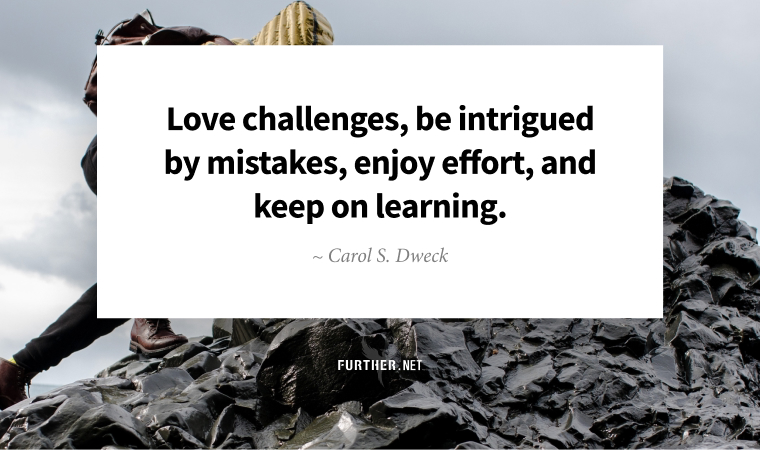
Challenges are hard, amirite? You’ve got to be bold and courageous to accomplish a goal, which takes grit and resilience.
Sounds exhausting when it’s put that way. Might as well give up before you even start.
And that’s the challenging thing about a challenge: your brain wants to turn it into something insurmountable from the outset. According to sustainable behavior change scientist Michelle Segar, Ph.D., this is the secret to your unsuccess.
What we are really doing with behavior change isn’t actually changing our behavior — it’s changing a mindset we’ve lived with all of our lives.
Therein lies the most challenging aspect of tackling difficult tasks. Luckily, all you need is a simple perspective change to make doing hard things easier.
Brain P.O.P.
Central to what Dr. Segar teaches is something we often discuss at Further: cultivating a growth mindset. Much of what we believe about confronting change falls in the fixed mindset category.
For example, if you want to improve your health, you think you have to be rigid about eating and exercise. One missed day leads to another, then another, and next thing you know, you’re eating pizza like you’re in an 80s commercial. This all-or-nothing thinking is a classic example of how a stumble can sideline us.
That said, embracing a growth mindset can be equally off-putting. You have to be willing to tolerate imperfection, which is uncomfortable. This is where Dr. Segar’s P.O.P. framework comes in:
Pause: When dealing with an unexpected challenge, pause and name any “decision traps” you’re facing.
Open your options and play: Identify how you can keep moving toward your goal. For example, an hour workout might be too much, but can you handle a 15-minute walk?
Pick the joy choice: Accept it’s OK to make the “imperfect” choice, so you do something instead of nothing.
Perfecting Imperfection
That said, plowing forward through setbacks can be mentally draining. As a reader of Dr. Segar’s book, The Joy Choice, admitted:
I think the ‘Opening up’ step is too hard to expect most people to be able to do, especially given how jam-packed our minds already are with things to remember and do.
As Dr. Segar points out, the reader already sees the framework as an either-or proposition. Instead, lead with flexibility and compassion.
An effective and kind way to begin to learn new things is to frame them as true learning projects.
Over in Further’s accountability and transformation community, Well + Wealthy, we’ve just completed a 108-Day Meditation Challenge. Almost everyone who started the challenge finished because we added room to experiment and play.
By popping the bubble of perfection, we made it simple to see the actual goal: progress.
How You See Your Challenges Influences How Hard They Are (Psychology Today)
